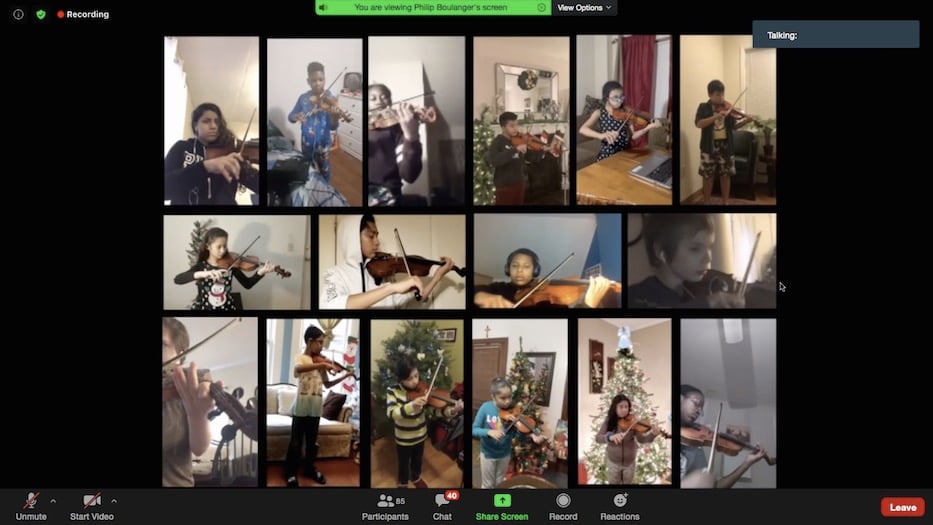
Music Haven's winter performance party last month. Screenshot from Zoom.
For almost a year, Music Haven’s staff has watched as students struggle with WiFi connections, food and housing insecurity, unemployment, and heightened risk of Covid-19. Now, an infusion of federal dollars means that it can stretch its services a little farther for each family.
Music Haven Director Mandi Jackson brought that story to local, state, and federal elected officials Tuesday afternoon, in a roundtable on recent CARES Act funding for Connecticut arts organizations. In November of last year, the nonprofit was one of 154 Connecticut arts organizations to receive a total of $9 million in federal CARES Act funding. The dollars were distributed by the Connecticut Office of the Arts.
In addition to New Haven Mayor Justin Elicker, Lt. Gov. Susan Bysiewicz, and U.S. Rep. Rosa DeLauro, the roundtable included executive directors from Music Haven, Neighborhood Music School (NMS), Long Wharf Theatre, and the Shubert Theatre. All were among organizations to receive funding last year.
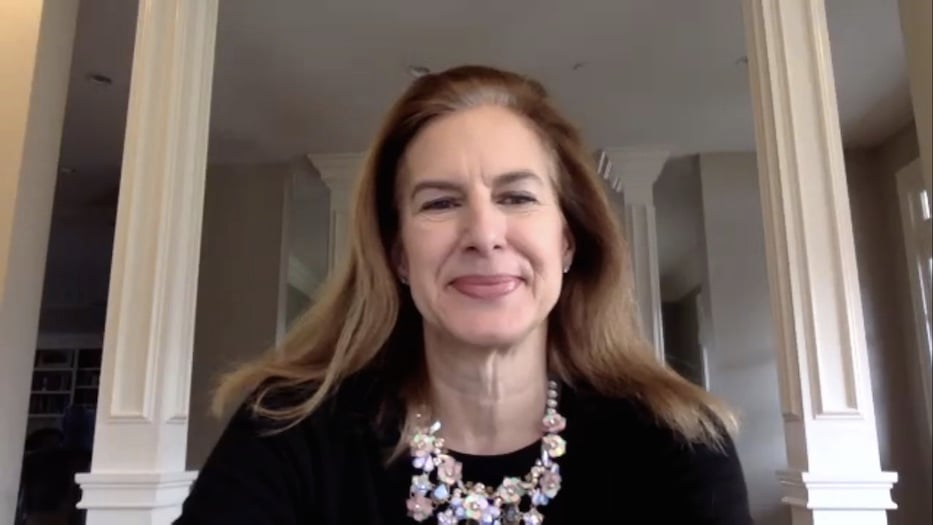
“Arts are not just an extra special thing or an afterthought, they are absolutely essential,” said Bysiewicz, calling DeLauro “heroic” in her advocacy for relief funding. “They’re essential to our state’s economy. They provide more than $4 billion a year in economic benefit and they support 57,000 jobs in our state. So arts are critical and foundational. They make Connecticut communities vibrant, and welcoming, and attractive.”
All recipients received $5,000 in unrestricted funding, followed by a 50 percent match of funds raised since March 2020. The funding is not related to the $15 billion Shuttered Venue Operators Grant Program (formerly known as the Save Our Stages Act), which passed as part of the $900 billion federal relief package in December of last year. Read more about that here.
One by one, recipients thanked both DeLauro and Bysiewicz for fighting for relief funding in the arts, a sector that has been particularly hard hit by pandemic restrictions on gathering. Kit Ingui, who is the managing director at Long Wharf Theatre, said that in the past year, the organization has faced projected losses of $1 million in ticket revenue alone. Since spring 2020, it has been forced to eliminate 40 full- and part-time staff positions. With nothing onstage, it has also been unable to employ the 75 guest artists, set and costume designers, dramaturgs and contract workers who come through its doors in a given year.
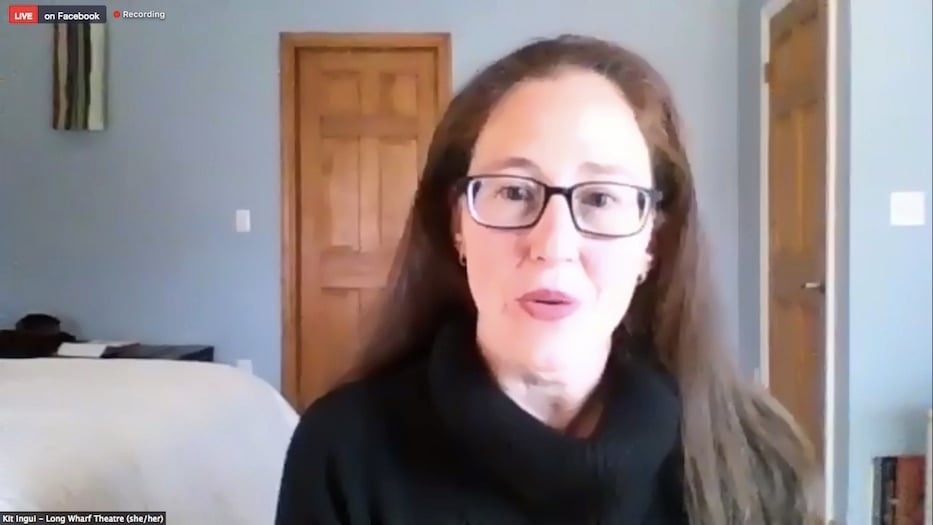
With the $551,400 that it received in CARES Act funding last fall, it is able to support remaining staff members, new play development, and its new “Stage Squad” program for high school students in New Haven. The last was part of its original vision for its 2020-2021 season that it is now able to realize in virtual space. Ingui added that the dollars will also assist the theater in its reopening plans, which will include new pandemic-era safety protocols.
“I see it as real leadership that the governor, the lieutenant governor, the administration showed, in how the arts are actually a tool to rebuild,” Ingui said. “This pandemic is going to affect us. The call for racial justice is going to affect us. For years and years, and decades. And without true investment in the arts, we’re left without that thing that grounds us. We’re grounded in storytelling. In building connection … it’s our pillar.”
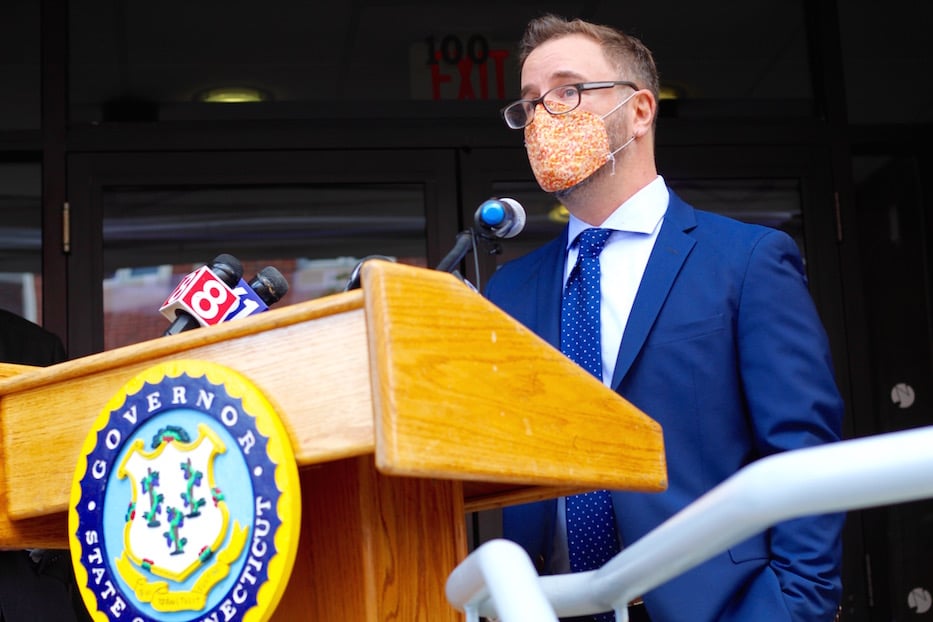
Bloom at NMS last October, when the Gov. Ned Lamont and the Connecticut Office of the Arts first announced the funding. Lucy Gellman File Photo.
Grant recipients also painted a picture of financial devastation from which both arts education and the performing arts will be slow to recover. Noah Bloom, executive director at NMS, said that the organization has lost upwards of $1.5 million in the last year, even as staff prep and teach virtual lessons from their homes. With $166,900 in CARES Act funding, he said he’s been able to provide scholarships, new technology, faculty health insurance, and “stay connected to students when they needed us the most.”
Before the pandemic, the school welcomed 2,500 students from over 80 towns across the state, and employed 150 faculty and staff. Although it has kept its all-ages music and arts programming, youth orchestra, preschool, and private middle school running, several sources of revenue have dried up. Even as he described a financial struggle ahead, Bloom kept his sense of humor: he suggested that DeLauro, whose childhood aspiration was to be a tap dancer, should join a new adult tap class.
“The arts are indeed essential,” he said. “For so many of our students, the one-on-one mentorship they received from their teachers at NMS is one of the most critical relationships in their lives. A community that has been built within our walls inspires our students, ignites their minds, and keeps them grounded. At a time when we are all looking to make sense of this challenging world, the arts are a vaccine for the mind and the soul.”
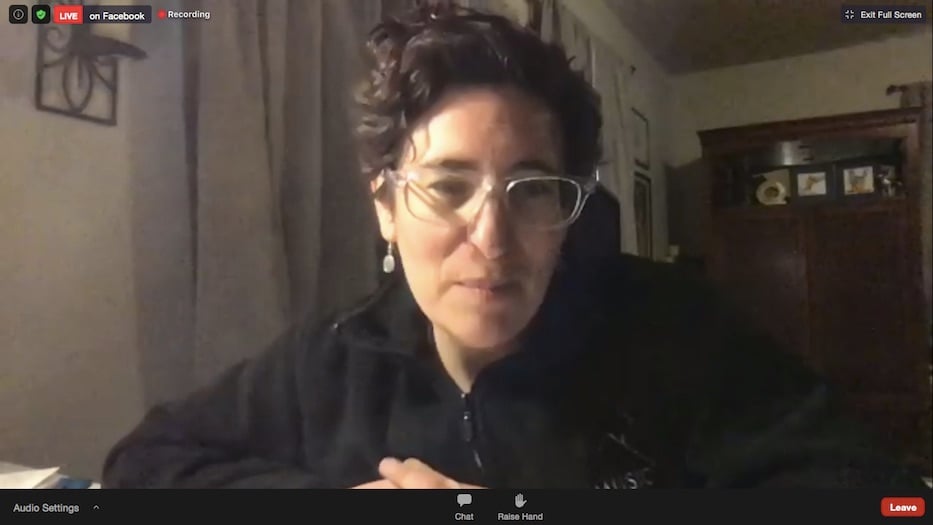
At Music Haven, Jackson has watched as families struggle not just with virtual music lessons but with the financial, physical, and emotional toll of Covid-19. In New Haven, Music Haven’s students come from chronically under-resourced and underfunded communities; many of their families were struggling with unemployment, food and housing security, and reliable access to technology and WiFi before the pandemic.
Jackson said that the allocation of $101,100 in CARES Act funding allows Music Haven to make sure it is providing its families not just with music lessons, but also mental health support, financial assistance, one-on-one check in meetings, and vital social services in the community. Jackson said she doesn’t see it as “mission creep,” so much as what an organization is obligated to do during a crisis like Covid-19.
“When I talk about connection, it’s very literal for us at Music Haven,” she said. “Music Haven has always helped connect our students and their families to support for basic needs, because kids can’t learn an instrument and participate in arts education programming if they don’t have a roof over their heads or something to eat, or any number of other things. What this pandemic has done is really forced us to invest a lot more time and resources in that part of our work.”
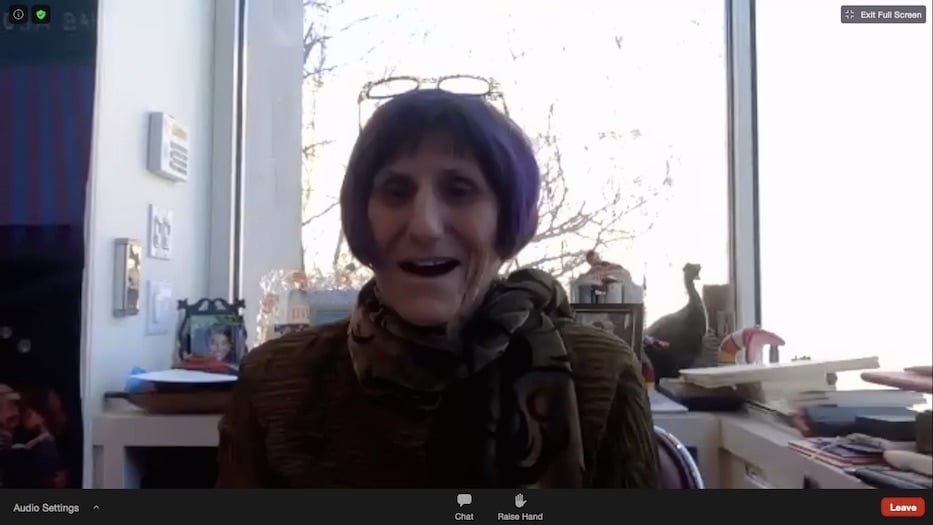
As she listened, DeLauro praised arts leaders for their work in the community, and noted that the $9 million must be a stepping stone to more funding on both the state and federal levels. While the $15 billion Shuttered Venue Operators Grant Program (formerly known as the Save Our Stages Act) passed last month, she said that she hopes to see more relief funding for the arts as President-Elect Joe Biden begins his first term in office this week.
“It is about our humanity and who we are,” she said. “It’s an indelible mark of relief to some of the most gifted and brilliant minds among all of us. Look … I don’t know how many state legislators are on the phone, but it is how we gather today in harmony. The versatility, the depth of the arts—to be explored, to be celebrated, to be enjoyed.”
“It’s not just about what you do, [it’s] about who you are,” she later added. “Behind every breathtaking painting is a painter. Behind every sculpture is a sculptor. And every design, there is a designer. It’s not about just beautification or adornment, but it is about improving that human condition at large.”
Watch the full roundtable above. Read our previous reporting on the funding, which was announced in late November, here. Here is a full list of recipients.